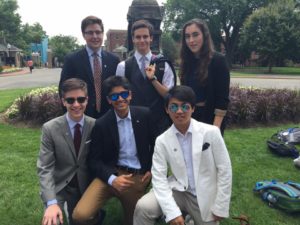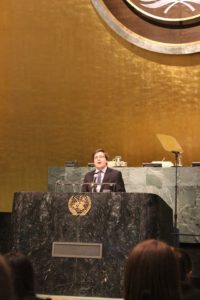Before going to the conference, I began to feel a lot of anxiety. I was afraid that I would to miss out on important information said by a delegate, or say something stupid that would make the committee think I wasn’t smart. However, in the end it all turned out to be fine. I had older teammates who I could learn from, and if I had a question, I would simply write a note. I appreciated that they looked out for me in committee. After the conference was over, I wanted to improve my skills so I could be just as good as my teammate who had won best in the committee. My parents were pleased to see me return with excitement.

Alex with his friends from MUNI
I soon would compete in over 40 Model UN conferences, and learn to love Model UN. However, I did face a lot of setbacks. The first is focusing. It took me up until junior year to actually be able to pay attention to a majority of the speeches being said. While I was a freshman and a sophomore, I wasn’t able to fully listen to what people were saying in their speeches because I was staring out into space, or trying to think of what to say when it was my turn to speak. However, going to the many Model UN conferences has helped me learned how to pay attention to what the delegates were saying without spacing out. Despite developing a better attention span in MUN, I cannot pay full attention when I’m in a 5 hour committee session. Nevertheless, I also noticed that that’s an issue for delegates even without ADHD.
The next obstacle I faced, and still face today, is multitasking. Multitasking is absolutely necessary for Model UN. You have to be able to pay attention to what delegates are saying, write down notes and clauses, fix any issues within your bloc, and more. This is definitely the skill that is hardest to master for anyone, let alone someone with ADHD. It took me over 3 years to figure out a balance, and is definitely something I haven’t completely mastered in Crisis. However, having a partner is definitely helpful for this. I was lucky enough to have partners at conferences like WMHSMUN, MUNUC, and NUMUN who have helped me with multitasking. In addition, they’re great with reminding you what was said in debate if you spaced out for a moment.
From personal experience, I have a much harder time with dealing with anxiety, especially if I’m by myself in a committee. I definitely have had a lot of it when it came to MUN. I always get nervous about things like my speeches and my writing. What helped me was taking a Communications course in high school, and learning techniques to calm down. The teacher was one of the debate coaches at my high school, so she also included techniques to calm down during a debate tournament or a MUN conference. I always use these techniques today when I’m about speak.
All students face some type of challenge in Model UN; my main obstacle was my ADHD. This experience is unique to me, and others facing similar obstacles might have different ones; however, I believe the larger story is that the MUN stereotype of a perfect student is not realistic. The best thing I’ve experienced through MUN is the empowerment it gave me to overcome my personal obstacles.

Alex speaking at the UNHQ during NHSMUN 2017


